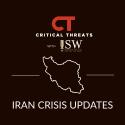Iran Crisis Update, December 10
Dec 10, 2022 - ISW PressThe Iranian regime is using protester executions to instill terror among the population. The Judiciary upheld a death sentence for 23-year-old Mahan Sadrat Madani on December 10. The regime charged Madani with "waging war against God” after he was arrested for brandishing a knife and protesting. The regime has set this low standard for the death penalty because of how easily protesters can identify with Madani and the nine other demonstrators currently on death row. Iranian authorities likely intend these executions to deter further protest turnout. This approach could easily backfire on the regime, however. Many protesters will likely sympathize with Madani and the others on death row, possibly inciting further popular unrest.







